Athlete recovery and wellness hubs represent a transformative shift in how schools and athletic programs approach student-athlete care—moving beyond traditional injury treatment to comprehensive wellness support addressing physical recovery, mental health, nutrition, sleep optimization, stress management, and holistic athlete development. These dedicated spaces and programs acknowledge that athletic excellence requires more than practice and competition; it demands systematic attention to recovery protocols, preventive care, and whole-person wellness that enables athletes to perform sustainably while maintaining long-term health.
Yet as schools invest in athlete recovery and wellness facilities, many struggle with how to appropriately recognize and celebrate these programs, the dedicated professionals who operate them, and the athletes who prioritize recovery as part of their training regimen. Traditional athletic recognition focuses almost exclusively on competitive achievement—championships won, records broken, individual statistics accumulated—while the foundational wellness work enabling those achievements remains largely invisible and uncelebrated.
This comprehensive guide explores effective strategies for creating athlete recovery and wellness hub recognition programs that honor the professionals, facilities, and athletes who prioritize comprehensive wellness, document the evolution of athletic care at your institution, and communicate organizational values that extend beyond competitive outcomes to embrace holistic athlete development and long-term health.
Recognizing athlete recovery and wellness initiatives appropriately honors the investment schools make in comprehensive athlete care while communicating cultural values that prioritize sustainable excellence over short-term performance gains. When institutions celebrate wellness programs prominently alongside competitive achievements, they demonstrate genuine commitment to athlete welfare while inspiring current and future athletes to embrace recovery practices as essential components of athletic excellence.
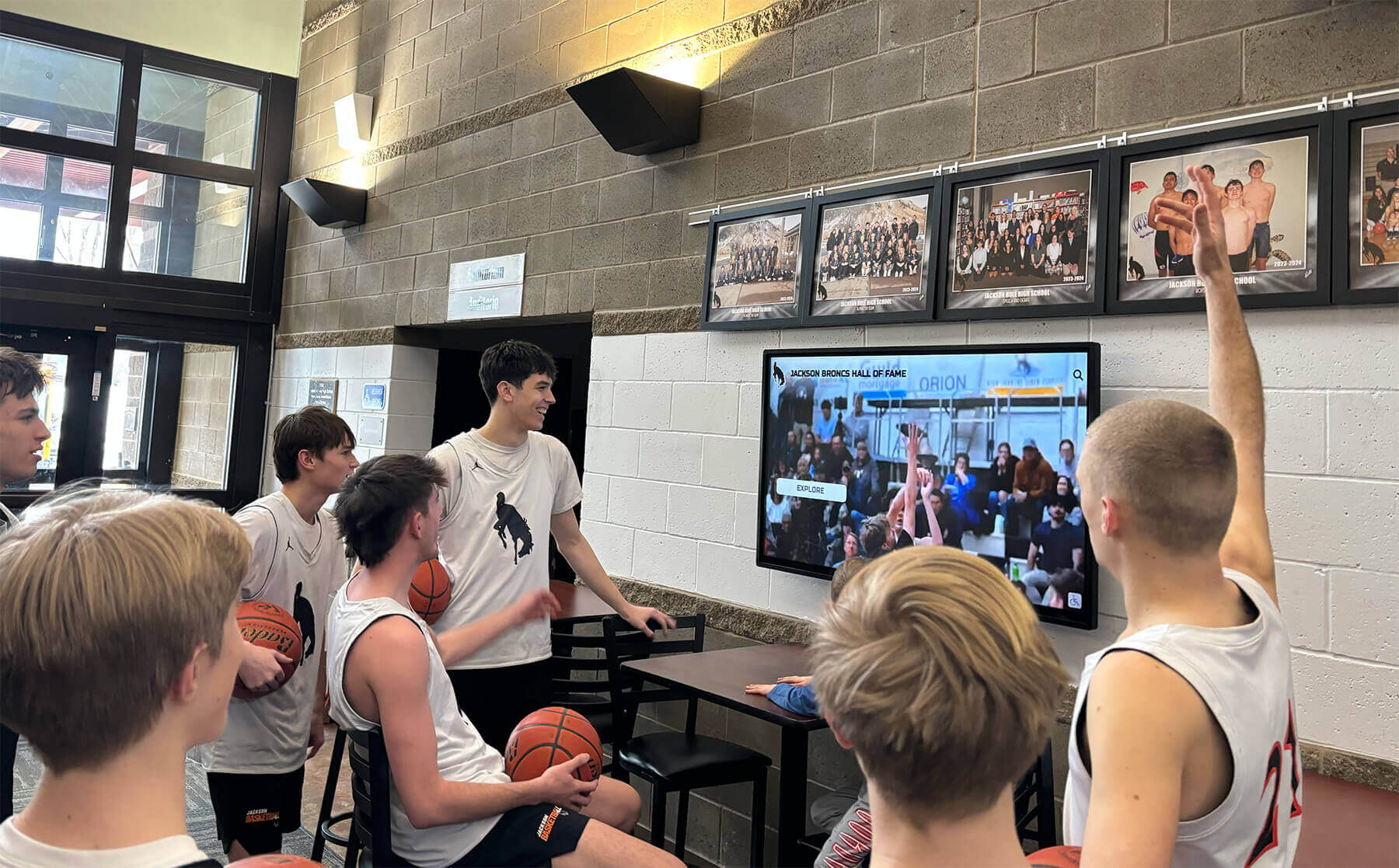
Modern digital displays enable schools to celebrate comprehensive athletic programs including wellness initiatives and recovery practices
Understanding Athlete Recovery and Wellness Hubs
Before implementing recognition programs, understanding what constitutes comprehensive athlete recovery and wellness hubs helps schools identify achievements worth celebrating and professionals deserving acknowledgment.
Core Components of Athlete Wellness Programs
Modern athlete recovery and wellness hubs typically encompass multiple interconnected dimensions of comprehensive care:
Physical Recovery and Rehabilitation
Evidence-based recovery modalities supporting optimal physical function:
- Sports medicine services providing injury evaluation and treatment
- Athletic training staff offering daily preventive care and rehabilitation
- Physical therapy programs addressing injury recovery and movement optimization
- Strength and conditioning specialists designing periodized training programs
- Recovery equipment including ice baths, compression therapy, and massage tools
- Nutrition support optimizing fueling strategies for performance and recovery
- Sleep education promoting rest as fundamental performance variable
Mental Health and Psychological Support
Psychological services addressing the mental demands of competitive athletics:
- Licensed mental health professionals providing counseling services
- Sports psychologists teaching performance psychology and mental skills training
- Stress management programs addressing academic and athletic pressure
- Team cohesion initiatives building supportive athletic communities
- Transition support helping athletes navigate injury, adversity, or career changes
- Mindfulness and meditation programs developing mental resilience
- Confidential resources ensuring athletes receive care without stigma
Learn about comprehensive teacher and staff recognition programs that can inform approaches to honoring athletic training professionals.
Academic and Personal Development Support
Holistic services supporting athlete success beyond competition:
- Academic counseling ensuring student-athletes maintain educational progress
- Time management training helping athletes balance multiple demands
- Career planning services preparing athletes for life after sports
- Leadership development programs building transferable life skills
- Financial literacy education supporting responsible decision-making
- Community service opportunities connecting athletics to broader purpose
- Life skills programming addressing nutrition, budgeting, relationships, and wellness
Physical Spaces and Facilities
Modern wellness hubs often include dedicated physical spaces housing comprehensive services:
Recovery Equipment and Spaces
- Hydrotherapy facilities with hot and cold plunge pools
- Compression therapy devices supporting circulation and recovery
- Massage therapy rooms providing soft tissue treatment
- Flexibility and mobility spaces for stretching and movement prep
- Quiet recovery areas enabling rest between training sessions
- Technology-based recovery tools including cryotherapy or infrared therapy
- Nutrition stations providing appropriate fueling options

Digital recognition systems enable comprehensive celebration of athletic excellence including wellness program achievements
Mental Health and Wellness Areas
Dedicated spaces supporting psychological well-being:
- Private counseling rooms ensuring confidential mental health services
- Meditation or mindfulness spaces providing quiet reflection areas
- Group meeting rooms facilitating team-building and education sessions
- Relaxation zones with comfortable seating and calming environments
- Resource libraries offering wellness education materials
- Technology enabling telehealth connections to mental health professionals
Understanding student mentorship and alumni discovery board programs provides frameworks for connecting wellness initiatives with broader developmental programming.
The Growing Importance of Athlete Wellness Recognition
Multiple factors drive increasing attention to comprehensive athlete care and the importance of recognizing wellness initiatives appropriately.
Shifting Cultural Understanding of Athletic Excellence
From Performance-Only to Holistic Development
Contemporary understanding of athletic excellence has evolved significantly:
- Recognition that sustainable high performance requires comprehensive wellness support
- Growing awareness of mental health’s critical role in competitive success
- Understanding that injury prevention through proper recovery reduces long-term health consequences
- Appreciation that athletes perform better when physical, mental, and academic needs are addressed
- Evidence that comprehensive support improves retention and reduces athlete burnout
- Research demonstrating that recovery practices enhance rather than detract from performance
According to Athletic Business magazine, colleges and universities across the United States have invested heavily in new athletic facilities in 2024 and 2025, with many institutions prioritizing recovery and wellness infrastructure alongside traditional training spaces. Penn State Athletics’ Greenberg Indoor Sports Complex, which opened in 2025, exemplifies this trend by providing centralized wellness and recovery amenities including hydrotherapy pools, red light beds, dry float beds, hyperbaric chambers, massage therapy, and saunas for student-athletes across all varsity sports.
Addressing Historical Neglect of Mental Health
Athletic culture has historically stigmatized mental health challenges:
- Pressure to appear mentally tough leading athletes to hide struggles
- Limited resources dedicated to psychological support in athletics
- Inadequate training for coaches in recognizing mental health needs
- Cultural messages equating help-seeking with weakness
- Tragic outcomes when athletes don’t receive appropriate mental health support
Modern wellness programs address these gaps while recognition initiatives demonstrate institutional commitment to changing athletic culture around mental health.
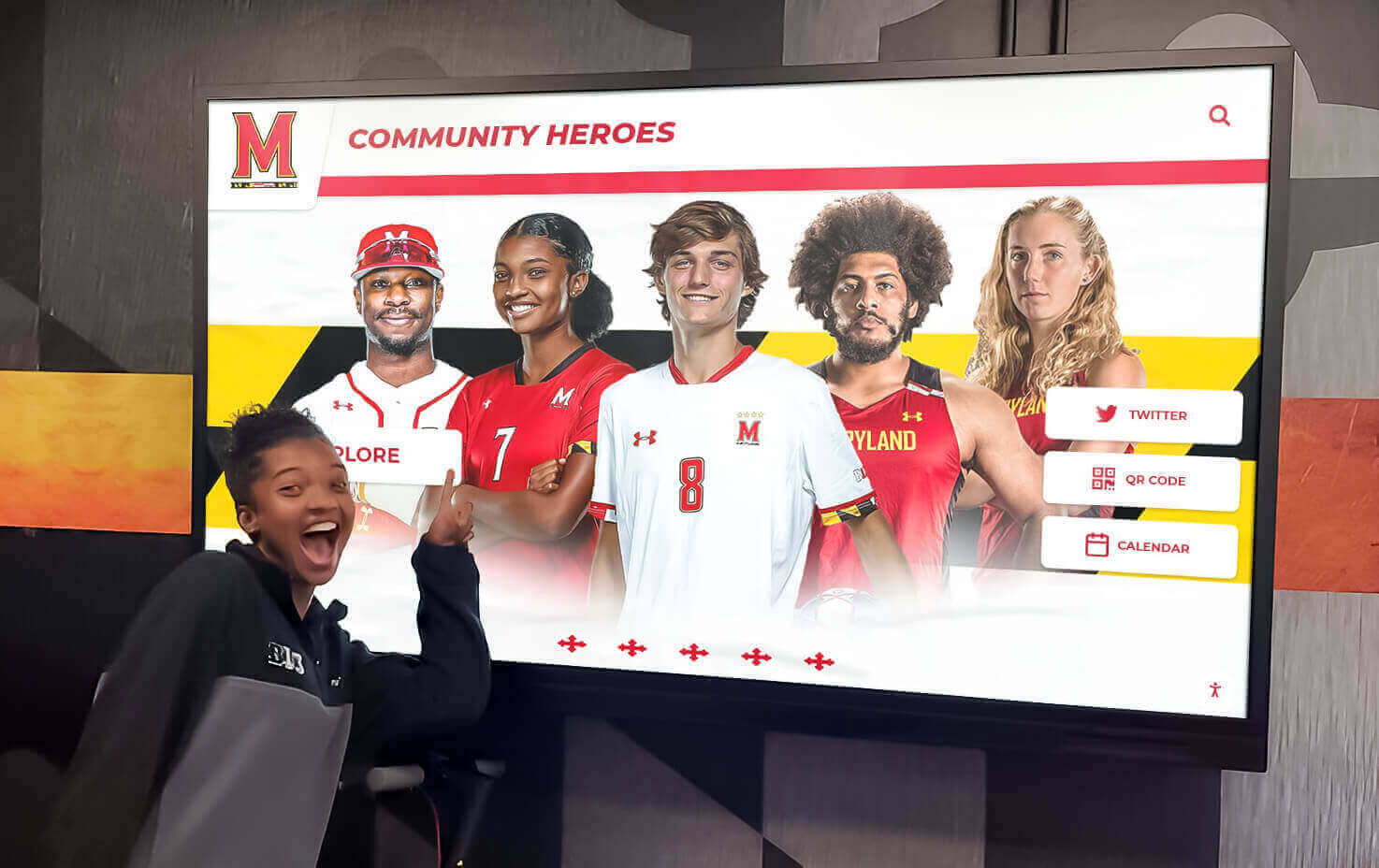
Interactive displays enable students to explore comprehensive athletic achievements including wellness program participation
Meeting Athletic Training Professional Recognition Needs
Honoring Behind-the-Scenes Expertise
Athletic trainers, sports medicine staff, and wellness professionals rarely receive recognition proportional to their impact:
- Coaches receive prominent acknowledgment while support staff remains invisible
- Championship celebrations highlight athletes and coaches while excluding medical teams
- Traditional athletic recognition focuses on competitive outcomes rather than care quality
- Professionals who prevent injuries receive less recognition than those treating them
- Mental health providers working confidentially can’t be celebrated publicly without violating privacy
Systematic wellness hub recognition addresses these gaps while honoring professionals whose work enables athletic excellence.
Supporting Professional Recruitment and Retention
Quality recognition programs support staffing of excellent wellness professionals:
- Recognition demonstrating institutional appreciation for comprehensive athlete care
- Visible celebration attracting talented professionals to athletic training positions
- Documentation of professional excellence supporting career advancement
- Public acknowledgment building professional reputation and credibility
- Cultural signals communicating that wellness work matters as much as coaching
- Retention of excellent professionals who feel valued and appreciated
Learn about donor recognition approaches that translate to acknowledging those who invest in athlete wellness.
Supporting Athletic Recruiting Through Wellness Programs
Competitive Advantage in Athlete Recruitment
Comprehensive wellness programs increasingly influence athlete college decisions:
- Prospective student-athletes evaluating total support systems rather than only competitive opportunities
- Parents prioritizing institutions demonstrating genuine care for athlete welfare
- Growing awareness among recruits about importance of recovery infrastructure
- Concern about long-term health consequences driving interest in preventive care
- Mental health resources becoming crucial evaluation criteria for athlete families
- Facility tours showcasing recovery and wellness spaces as recruitment selling points
Prominent recognition of wellness programs communicates institutional priorities while differentiating schools from competitors lacking comprehensive support systems.
Addressing Parent Concerns About Athlete Welfare
Modern parents bring heightened awareness of athletic risks:
- Increased understanding of concussion risks and long-term consequences
- Awareness of overtraining dangers and youth sports specialization concerns
- Recognition that athletic pressure can trigger mental health challenges
- Concern about institutions prioritizing winning over athlete health
- Desire for transparency about injury rates and medical care quality
- Expectation that schools will address whole-person athlete development
Visible wellness hub recognition reassures parents while demonstrating genuine institutional commitment to athlete safety and long-term health.
Explore academic recognition programs that balance achievement celebration with holistic student development.
Traditional Approaches to Wellness Recognition
Understanding conventional methods provides context for their benefits and limitations when planning comprehensive recognition programs.
Athletic Training Staff Acknowledgment
End-of-Season Team Recognition
Many programs include athletic trainers in team celebrations:
- Brief acknowledgment during championship celebrations or banquets
- Inclusion in team photos recognizing season accomplishments
- Generic thank-you speeches from coaches or captains
- Occasional gifts or plaques from senior classes
- Social media posts during National Athletic Training Month
While these gestures demonstrate appreciation, they typically provide minimal visibility and fail to communicate the comprehensive scope of athletic training work.
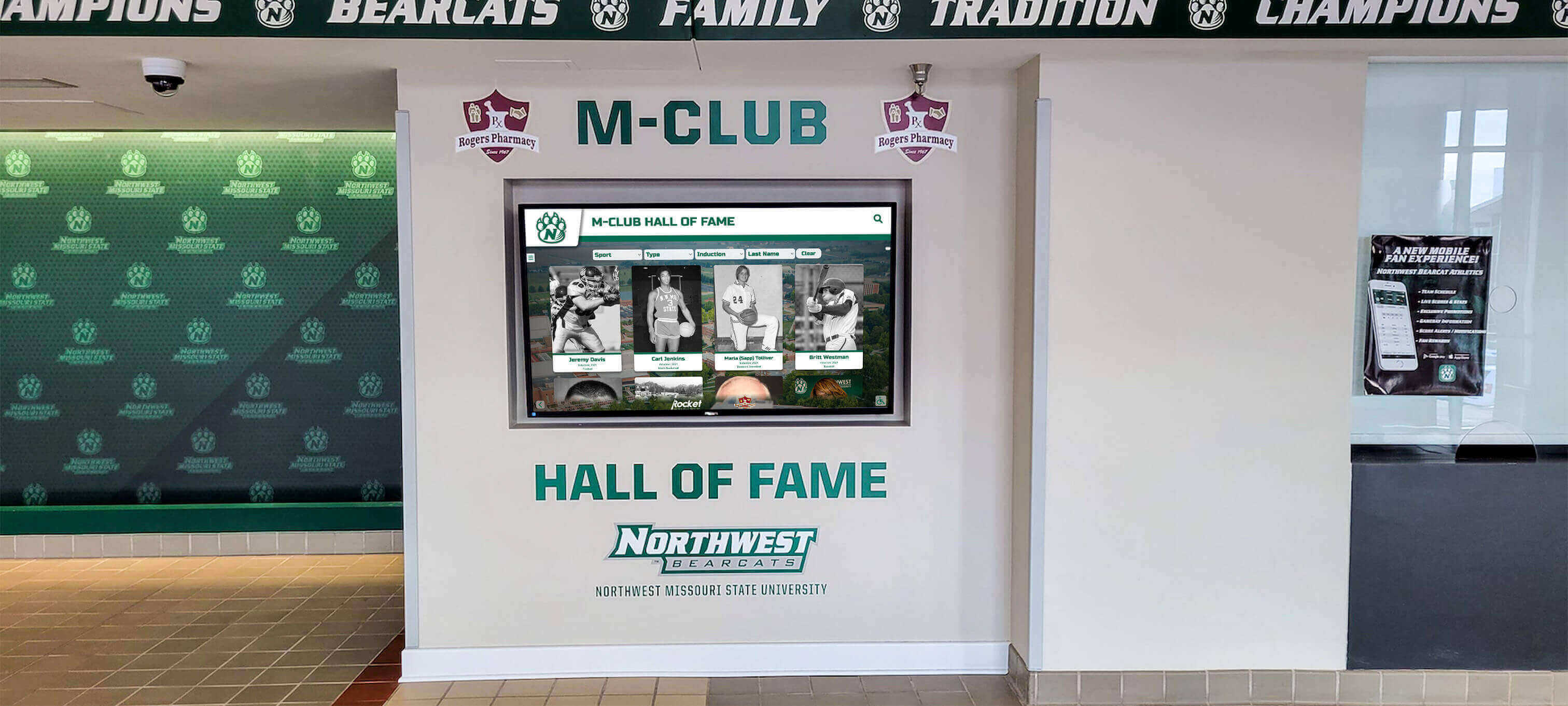
Permanent recognition displays honor comprehensive athletic program excellence including support staff contributions
Professional Awards and External Recognition
Athletic training professionals may receive acknowledgment through professional associations:
- State or national athletic trainers’ association awards
- Conference-level recognition for athletic training excellence
- Professional organization distinctions for clinical practice or innovation
- External certifications demonstrating continued professional development
These important recognitions typically remain invisible to student-athletes, parents, and broader school communities who would benefit from understanding athletic training excellence.
Wellness Program Promotion
Informational Marketing
Schools often promote wellness resources through various channels:
- Websites listing available wellness services and contact information
- Printed materials distributed during athletic orientations
- Presentations to teams about mental health and recovery resources
- Social media posts during awareness weeks or special initiatives
- Newsletter articles describing new wellness programs or services
- Email communications reminding athletes about available support
While this information sharing serves important purposes, it primarily functions as resource awareness rather than recognition celebrating wellness program excellence or honoring professionals providing services.
Facility Dedication and Naming
Building and Space Recognition
Some institutions recognize major donors or honored individuals through facility naming:
- Athletic training facilities named for prominent donors or respected professionals
- Wellness centers bearing names of benefactors who funded construction
- Recovery rooms dedicated to alumni who supported wellness initiatives
- Memorial dedications honoring professionals who served programs for decades
While meaningful, these recognitions typically acknowledge a single individual or family rather than comprehensively celebrating ongoing wellness program excellence or current professional staff contributions.
Understanding school history preservation approaches provides frameworks for documenting institutional wellness program evolution.
Modern Digital Recognition for Athlete Wellness Hubs
Digital recognition platforms enable comprehensive celebration of wellness initiatives while overcoming traditional approach limitations.
Documenting Wellness Program Evolution
Solutions like Rocket Alumni Solutions provide platforms for systematically preserving institutional wellness program history:
Historical Documentation of Program Development
Comprehensive digital archives can chronicle:
- Evolution of athletic training services from basic injury treatment to comprehensive care
- Timeline of facility expansions and wellness infrastructure investments
- Introduction of mental health services and psychological support
- Development of nutrition programs supporting athlete fueling strategies
- Implementation of recovery protocols and evidence-based practices
- Educational initiatives teaching athletes about wellness and self-care
- Partnerships with healthcare providers expanding available services
This historical documentation demonstrates institutional commitment to athlete welfare while preserving organizational knowledge that might otherwise be lost as staff transition.
Professional Staff Recognition Profiles
Digital platforms enable comprehensive acknowledgment of wellness professionals:
- Detailed profiles of athletic trainers, sports psychologists, and wellness staff
- Educational background and professional certifications documentation
- Years of service and athletes supported throughout careers
- Special initiatives developed or implemented during tenure
- Professional recognition and awards received
- Philosophy of athlete care and approach to comprehensive wellness
- Memorable moments and significant athlete recovery successes
- Advice for athletes about injury prevention and wellness optimization
This depth of recognition honors individual professionals while communicating their expertise and dedication to athlete care.
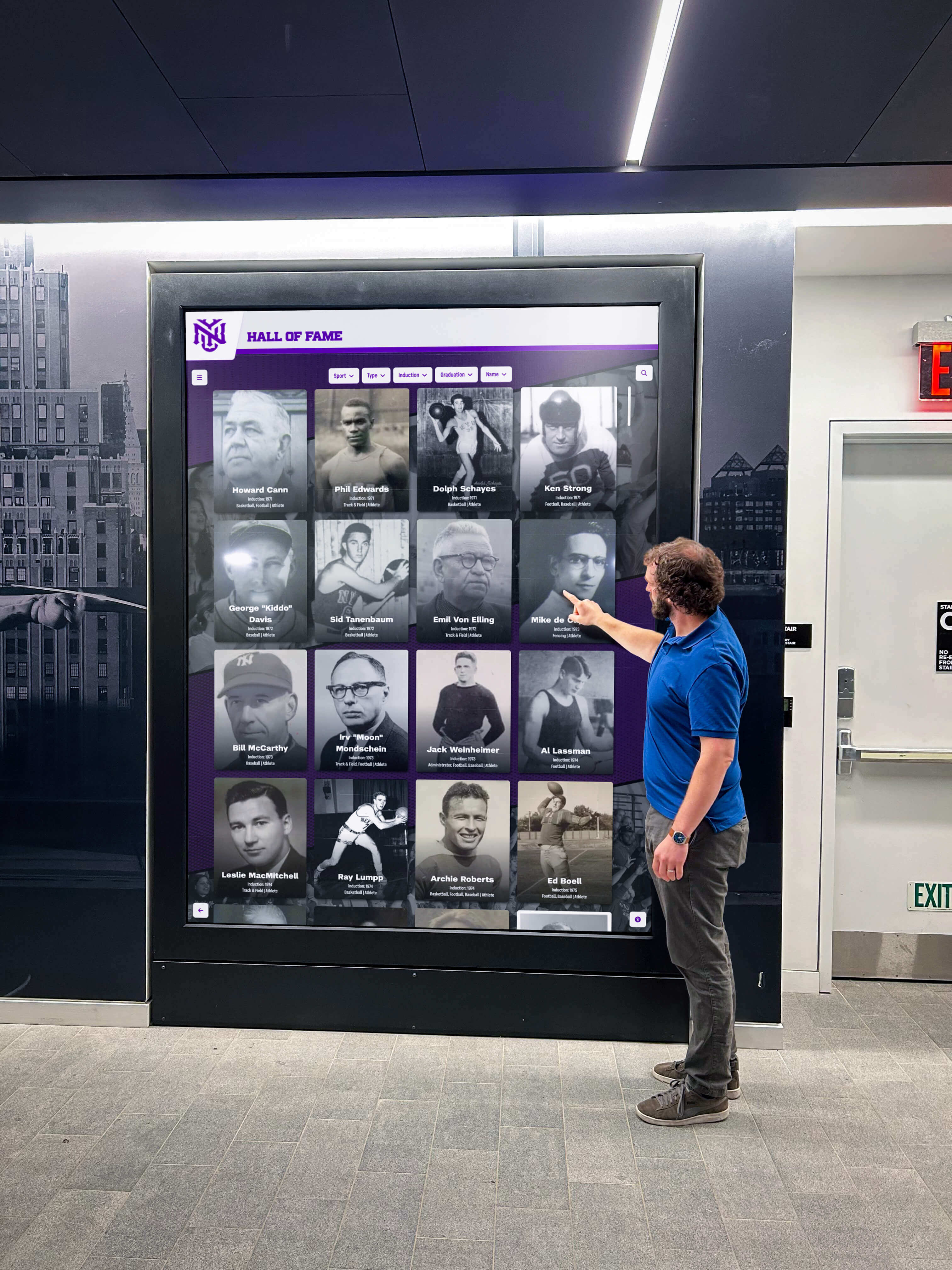
Interactive displays enable detailed exploration of comprehensive athletic programs including wellness initiatives and support staff contributions
Celebrating Athlete Wellness Achievements
Recovery Milestone Recognition
Digital systems can celebrate athlete commitment to comprehensive wellness:
- Athletes demonstrating exceptional dedication to injury rehabilitation
- Student-athletes who successfully returned from significant injuries
- Individuals who prioritized recovery practices and injury prevention
- Athletes who accessed mental health resources and supported teammates
- Examples of proper nutrition, sleep, and wellness habit adoption
- Peer leaders who promoted team wellness and comprehensive self-care
- Athletes who balanced competitive excellence with long-term health priorities
This recognition normalizes wellness practices while inspiring other athletes to prioritize recovery and comprehensive care.
Team Wellness Culture Celebration
Acknowledge teams demonstrating outstanding wellness commitment:
- Teams with lowest injury rates due to prevention emphasis
- Programs with highest mental health resource utilization
- Teams demonstrating supportive culture around recovery and wellness
- Groups that normalized help-seeking and resource access
- Teams integrating wellness practices into training culture
- Programs where captains actively promoted comprehensive athlete care
Team-level recognition communicates that wellness culture represents collective achievement deserving celebration.
Learn about athletic hall of fame creation approaches that can incorporate wellness achievement recognition.
Educational Content Integration
Wellness Education Through Recognition Displays
Digital platforms enable embedding educational content within recognition:
- Recovery protocol explanations integrated with athlete success stories
- Mental health resource information presented alongside support program acknowledgment
- Nutrition education content connected to athlete fueling practices
- Sleep optimization strategies highlighted through athlete wellness examples
- Injury prevention tips incorporated into recovery success stories
- Stress management techniques presented through athlete mental health journeys
This educational integration serves dual purposes—recognizing excellence while teaching athletes about evidence-based wellness practices.
Research and Evidence Sharing
Recognition displays can communicate scientific foundations of wellness programs:
- Research demonstrating recovery practice effectiveness
- Studies connecting mental health support to performance outcomes
- Evidence about injury prevention through proper training and recovery
- Data showing academic performance benefits from comprehensive support
- Longitudinal research on athlete health and long-term outcomes
- Program-specific metrics demonstrating wellness initiative impact
Evidence-based content builds credibility while educating audiences about why comprehensive wellness matters.
Interactive Wellness Resource Access
Integrated Service Information
Digital recognition systems can incorporate functional resource access:
- Athletic training service hours and contact information
- Mental health resource directories and appointment scheduling
- Nutrition consultation booking and dietary guidance access
- Recovery space reservations and equipment availability
- Educational resource libraries about wellness topics
- Emergency contact information for urgent situations
- Referral processes for specialized care beyond school resources
This integration transforms recognition displays into functional wellness hubs while ensuring athletes can easily access available services.
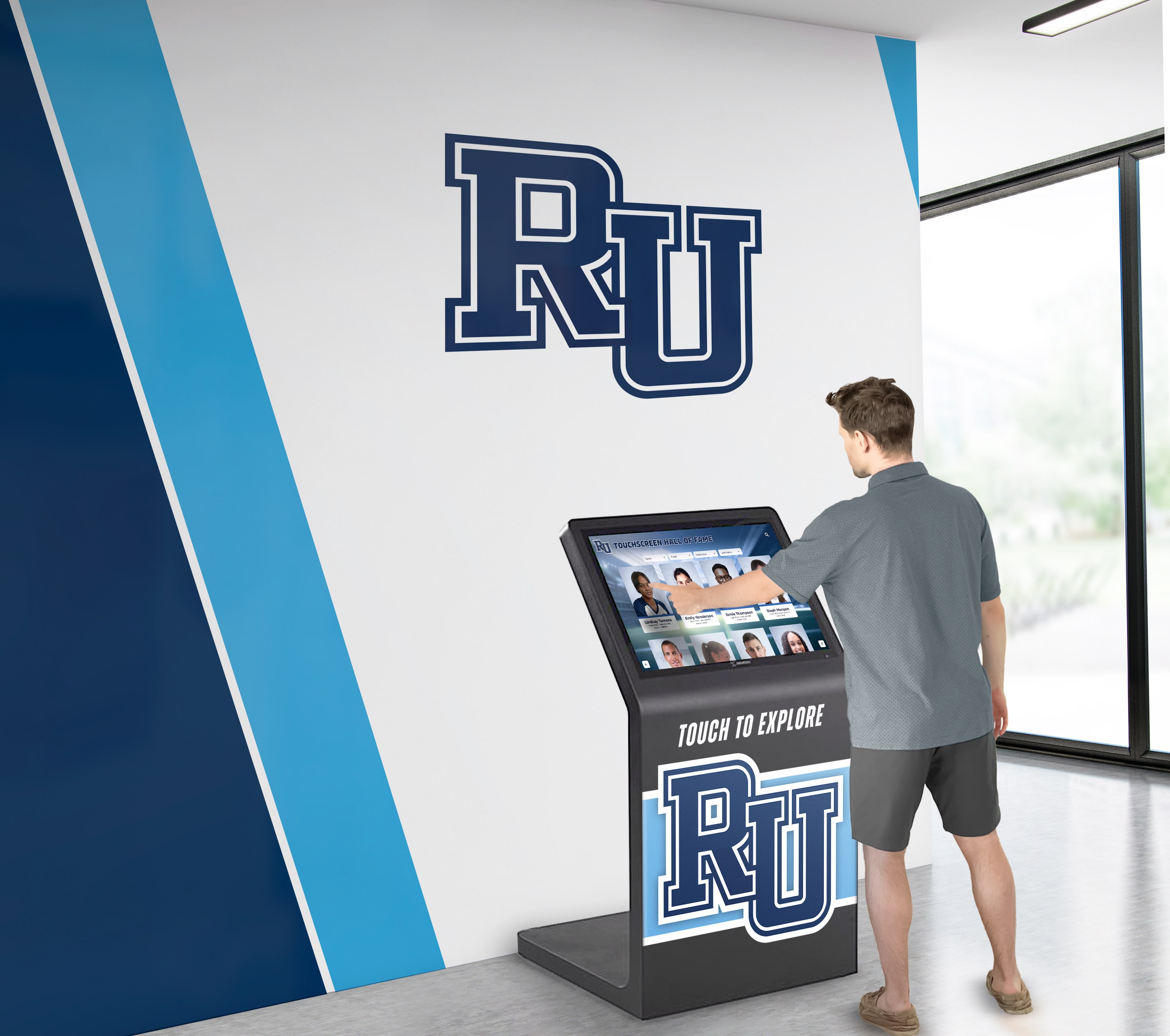
Interactive kiosks provide accessible platforms for both recognition and functional service access
Implementing Athlete Wellness Recognition Programs
Successful programs require systematic planning addressing unique sensitivities around wellness and health information.
Establishing Recognition Criteria and Privacy Protocols
Defining Appropriate Recognition Scope
Clear policies ensure recognition respects privacy while celebrating wellness:
- Which wellness achievements can be recognized publicly versus privately
- How to acknowledge athletes using mental health resources without identifying specific individuals
- Protocols for obtaining athlete permission before recognizing recovery journeys
- Guidelines distinguishing between celebrating injury recovery versus glorifying playing through pain
- Standards for recognizing professionals without violating patient confidentiality
- Approaches to collective recognition that don’t require individual identification
FERPA and HIPAA Compliance
Legal requirements governing student health information:
- Educational records protection under Family Educational Rights and Privacy Act
- Health information privacy under Health Insurance Portability and Accountability Act
- Consent requirements before sharing any health-related information publicly
- Limitations on mental health information disclosure even with permission
- Staff training ensuring all wellness recognition complies with regulations
- Documentation of appropriate permissions for all shared information
Athletic directors and wellness professionals should consult with school legal counsel when developing wellness recognition programs to ensure full compliance with applicable privacy regulations.
Learn about student athlete recognition approaches that balance celebration with appropriate privacy protections.
Creating Comprehensive Content
Professional Staff Profile Information
Essential content celebrating wellness professionals:
- Full name and professional credentials
- Role within athletic wellness program
- Years of service to institution and athletes served
- Educational background and specialized training
- Professional philosophy and approach to athlete care
- Memorable moments or significant program contributions
- Professional recognition and awards received
- Personal reflections on privilege of serving student-athletes
Program Evolution Documentation
Historical content preserving wellness initiative development:
- Timeline of major wellness program milestones
- Facility construction or renovation projects
- Introduction of new services or resources
- Partnerships established with healthcare providers
- Educational initiatives implemented
- Professional staff additions expanding service capacity
- Equipment acquisitions enabling enhanced recovery
- Cultural shifts toward comprehensive athlete care

Integrated recognition installations combine traditional aesthetic elements with modern digital capabilities
Athlete Wellness Success Stories (With Appropriate Permissions)
Inspiring narratives celebrating comprehensive care:
- Athletes who successfully recovered from significant injuries
- Student-athletes who accessed mental health support and thrived
- Individuals who adopted comprehensive wellness practices
- Team captains who promoted wellness culture among teammates
- Athletes who balanced competitive excellence with sustainable health practices
- Examples demonstrating long-term benefits of prioritizing recovery
All individual stories require explicit written permission with clear understanding of what information will be shared publicly.
Planning Recognition Events and Ceremonies
Annual Wellness Excellence Awards
Formal recognition ceremonies celebrating comprehensive care:
- Athletic training staff appreciation events honoring medical professionals
- Wellness champion awards for athletes demonstrating outstanding self-care
- Team wellness culture recognition acknowledging collective commitment
- Innovation awards for new programs or initiatives improving athlete care
- Longevity recognition for professionals serving athletes across decades
- Community partner acknowledgment for organizations supporting athlete wellness
Integration with Existing Athletic Celebrations
Incorporating wellness recognition into established traditions:
- Athletic training staff acknowledgment during championship celebrations
- Wellness program updates included in athletic awards banquets
- Mental health awareness integration with team captain recognitions
- Recovery excellence acknowledgment during senior athlete tributes
- Facility dedication ceremonies when new wellness spaces open
- Alumni events highlighting how wellness programs have evolved
Integrated recognition demonstrates wellness as fundamental to athletic excellence rather than separate concern.
Explore state championship recognition strategies that can incorporate wellness program celebration.
Maximizing Wellness Recognition Impact
Strategic approaches amplify effectiveness while supporting comprehensive athlete care culture.
Building Wellness-Positive Athletic Culture
Normalizing Help-Seeking and Resource Utilization
Recognition that reduces stigma around accessing wellness services:
- Visible celebration of athletes using mental health resources
- Acknowledgment that requesting recovery support demonstrates maturity
- Stories of successful athletes who prioritized comprehensive care
- Team captain leadership examples promoting wellness culture
- Coach testimonials emphasizing importance of athlete self-care
- Alumni reflections on wishing they’d accessed available resources earlier
Cultural shift requires consistent messaging that wellness resource utilization represents strength rather than weakness.
Redefining Athletic Toughness
Modern understanding of resilience and mental strength:
- Recognition that proper recovery enables harder training
- Understanding that addressing mental health improves performance
- Appreciation that injury prevention demonstrates intelligence
- Acknowledgment that asking for help requires courage
- Examples of elite athletes prioritizing comprehensive wellness
- Research connecting proper recovery with sustained excellence
Prominent recognition reinforces that authentic toughness includes prioritizing long-term health over short-term competitive pressure.
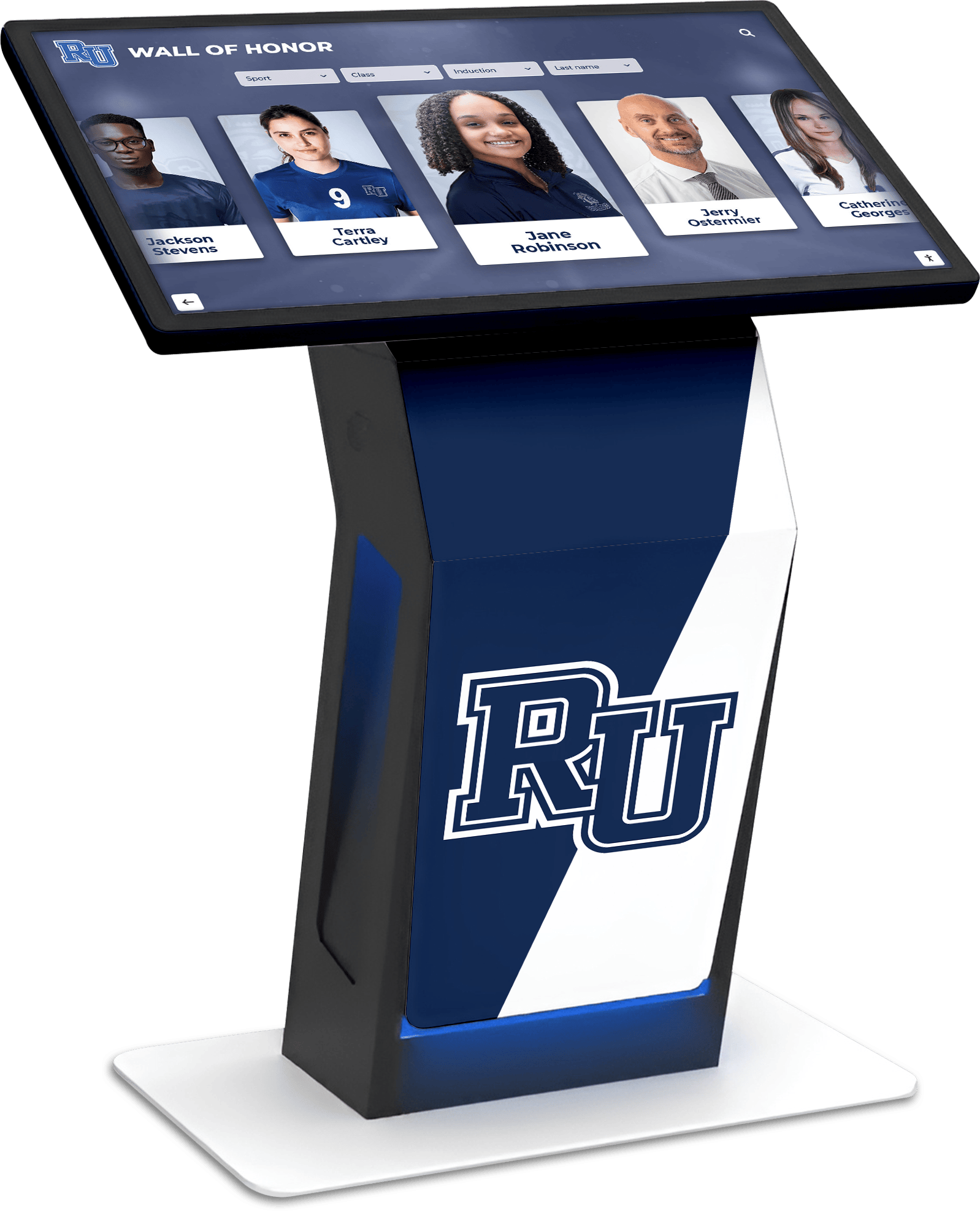
Purpose-built recognition kiosks provide engaging platforms for celebrating comprehensive athletic excellence
Supporting Prospective Student-Athlete Evaluation
Transparent Wellness Program Communication
Information helping recruits and families evaluate programs:
- Complete inventory of available wellness services and resources
- Athletic training staff credentials and areas of expertise
- Mental health services available to student-athletes
- Recovery equipment and facilities accessible to teams
- Academic support specifically designed for athletes
- Injury rates and return-to-play protocols
- Athlete testimonials about wellness program quality
Transparency demonstrates confidence in program quality while enabling informed decision-making during recruitment.
Facility Tours Emphasizing Comprehensive Care
Strategic showcasing of wellness infrastructure:
- Athletic training facilities featured prominently during campus visits
- Recovery spaces highlighted as competitive advantages
- Mental health resources presented as standard athlete support
- Wellness professional introductions during recruiting events
- Athlete hosts discussing personal wellness resource experiences
- Parent-specific presentations addressing athlete welfare priorities
Recognition systems visible during tours communicate institutional values while differentiating programs from competitors.
Connecting Alumni Through Wellness Evolution
Historical Context for Program Development
Alumni engagement through wellness program progression:
- Documentation of how athletic care has evolved since alumni competed
- Recognition of generational improvements in athlete support
- Acknowledgment that earlier athletes lacked current resources
- Appreciation for alumni who advocated for wellness investments
- Examples of alumni who contributed to wellness program development
- Stories connecting past athletes’ experiences to current improvements
Historical perspective builds pride in program evolution while engaging alumni in continued wellness support.
Alumni Wellness Resource Extension
Some institutions extend wellness resources to alumni:
- Mental health services available to former student-athletes
- Career transition support for retiring competitors
- Injury prevention education for aging former athletes
- Networking connecting alumni with wellness professionals
- Programs addressing post-athletic identity and mental health
- Educational content about maintaining long-term health after competition
Extended support demonstrates lasting institutional commitment while strengthening alumni engagement.
Learn about alumni welcome area design approaches that can incorporate wellness program history.
Special Considerations for Wellness Recognition
Several additional factors enhance program effectiveness while ensuring appropriate, sensitive implementation.
Mental Health Recognition Sensitivities
Balancing Celebration with Confidentiality
Mental health recognition requires exceptional care:
- Never identifying specific athletes using mental health services without explicit permission
- Focusing recognition on program availability rather than individual utilization
- Celebrating cultural shifts toward wellness rather than individual diagnoses
- Acknowledging athletic training staff without violating patient confidentiality
- Using aggregate data showing program impact without individual identification
- Creating recognition that destigmatizes without sensationalizing mental health
Mental health professionals should review all recognition content involving psychological services to ensure appropriate clinical and ethical standards.
Avoiding Glorification of Mental Health Struggles
Responsible recognition prevents problematic messaging:
- Not romanticizing mental illness or presenting suffering as noble
- Avoiding implication that mental health challenges are prerequisites for success
- Ensuring recognition emphasizes treatment effectiveness and recovery
- Preventing competitive mindset around “who struggled most”
- Focusing on strength of accessing resources rather than severity of symptoms
- Maintaining perspective that mental health is health requiring appropriate care
Thoughtful approach prevents recognition from inadvertently reinforcing unhealthy perspectives about psychological wellness.
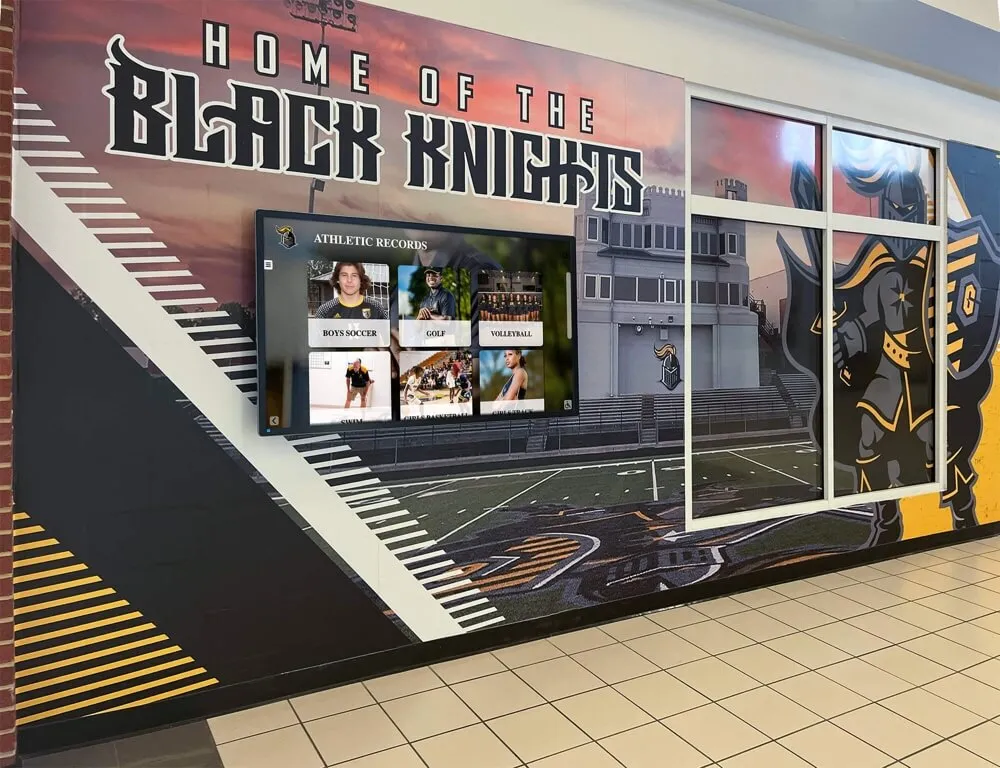
Comprehensive hallway installations celebrate complete athletic programs including wellness and support initiatives
Preventing Harmful “Playing Through Injury” Glorification
Distinguishing Recovery Success from Pain Tolerance
Recognition that promotes healthy practices:
- Celebrating successful injury rehabilitation rather than playing injured
- Honoring athletes who prioritized long-term health over single competitions
- Acknowledging difficult decisions to rest despite competitive pressure
- Recognizing coaches who enforced appropriate injury protocols
- Highlighting athletes who returned stronger through proper recovery
- Examples of successful careers enabled by appropriate injury management
Cultural messages must consistently prioritize long-term athlete health over short-term competitive outcomes.
Reframing Traditional “Warrior” Narratives
Modern understanding of sustainable excellence:
- Recognition that proper recovery enables longer competitive careers
- Understanding that injury prevention demonstrates wisdom
- Appreciation that protecting athletes represents responsible coaching
- Acknowledgment that medical professionals who restrict participation demonstrate courage
- Examples of elite athletes whose careers ended prematurely from inadequate recovery
- Research connecting proper injury management with long-term success
Recognition programs should actively counter harmful “play through pain” cultural messages still prevalent in competitive athletics.
Equity in Wellness Resource Access
Ensuring Universal Service Availability
Recognition programs should reflect equitable access:
- Services available to all athletes regardless of sport revenue generation
- Mental health resources accessible across all teams
- Recovery equipment available to all programs
- Athletic training coverage proportional to team needs
- Transportation to specialized care when needed
- Financial assistance for wellness services not covered by insurance
Recognition celebrating wellness programs should accurately reflect actual resource availability rather than aspirational messaging contradicted by athlete experiences.
Addressing Disparities in Athlete Treatment
Honest acknowledgment of resource allocation:
- Recognition of efforts to improve equity across programs
- Transparency about differences in service levels between sports
- Celebration when historically underserved teams receive improved resources
- Acknowledgment of student-athlete advocacy improving wellness access
- Documentation of progress toward comprehensive universal support
Authentic recognition addresses reality while demonstrating commitment to continued improvement rather than pretending equity already exists.
Explore budget-friendly recognition approaches supporting comprehensive programs regardless of resource constraints.
Budget Considerations and Funding Strategies
Realistic planning ensures sustainable implementation of comprehensive wellness recognition programs.
Understanding Investment Requirements
Digital Recognition System Costs
Initial and ongoing expenses for digital platforms:
- Display hardware and installation: $3,000-$15,000 depending on size and location
- Software licensing for content management: $500-$2,500 annually
- Initial content development gathering historical information and professional profiles
- Professional photography and videography when needed
- Graphic design and template development
- Technical support and maintenance contracts
- Regular content updates as programs evolve
Traditional Recognition Expenses
Alternative or complementary physical recognition:
- Plaques or wall displays honoring wellness professionals
- Naming opportunities for wellness spaces or facilities
- Annual awards and ceremonial recognition items
- Printed materials promoting wellness programs
- Event expenses for wellness celebration ceremonies
- Renovations creating dedicated recognition areas
Many schools find digital recognition offers better long-term value by enabling comprehensive content that’s easily updated versus static physical displays requiring ongoing modification costs.
Identifying Funding Sources
Institutional Budget Integration
Incorporating wellness recognition into regular operations:
- Athletic department facilities and operations budgets
- Student health and counseling services budgets
- Institutional advancement and communications allocations
- Technology and digital infrastructure investments
- Building and grounds maintenance for recognition installations
Philanthropic Support
Engaging donors passionate about athlete welfare:
- Alumni athletes who value comprehensive care and want to support current generations
- Parents whose children benefited from wellness programs
- Healthcare professionals supporting preventive athletic medicine
- Community members passionate about youth mental health
- Local businesses related to health, wellness, or recovery
- Foundations focused on athlete welfare or youth development
Wellness recognition often resonates with donors who care about athlete welfare and appreciate investment in comprehensive care rather than only competitive excellence.
Grant Opportunities
External funding supporting wellness initiatives:
- Health-focused foundations supporting youth wellness programs
- Mental health organizations promoting adolescent psychological care
- Sports safety initiatives addressing injury prevention
- Academic-athletic balance programs supporting student-athlete welfare
- Technology grants for innovative educational displays
Grant applications often benefit from incorporating recognition components demonstrating sustainability and long-term cultural impact of funded wellness programs.
Conclusion: Building Recognition That Honors Comprehensive Athlete Care
Athlete recovery and wellness hubs represent fundamental shifts in how schools approach competitive athletics—acknowledging that sustainable excellence requires comprehensive support addressing physical recovery, mental health, academic success, and whole-person development. As institutions invest in wellness infrastructure, services, and professional staff, recognition programs celebrating these initiatives communicate authentic commitment to athlete welfare while building cultural acceptance that recovery and wellness deserve celebration equal to competitive achievement.
The strategies explored throughout this guide provide frameworks for creating wellness recognition programs that appropriately honor the professionals providing comprehensive care, the facilities enabling evidence-based recovery practices, and the athletes who prioritize sustainable excellence over short-term performance. From establishing privacy-compliant recognition protocols to implementing engaging digital displays to planning meaningful celebration ceremonies, these approaches transform wellness from invisible support service into celebrated institutional priority.
Ready to transform how your institution celebrates athlete wellness and comprehensive care? Modern digital recognition solutions help schools honor wellness initiatives comprehensively while creating engaging experiences that preserve program evolution and professional contributions. Solutions like Rocket Alumni Solutions provide platforms specifically designed for comprehensive athletic recognition, offering unlimited capacity for documenting wellness program development, rich professional profiles celebrating medical staff expertise, educational content integration supporting athlete wellness literacy, and interactive displays engaging communities in understanding comprehensive athlete care importance.
Whether establishing first-ever wellness recognition programs or enhancing existing initiatives through modern digital platforms, success requires developing systematic approaches ensuring appropriate professional acknowledgment, creating meaningful content celebrating comprehensive care, and implementing sustainable systems maintaining recognition relevance as programs evolve.
Your athlete recovery and wellness professionals invest countless hours supporting student-athlete welfare through injury treatment, mental health counseling, nutrition education, and comprehensive wellness promotion. These dedicated professionals enable athletic excellence while prioritizing long-term athlete health over short-term competitive outcomes. Their contributions deserve recognition that honors their expertise while demonstrating that institutions value comprehensive care as much as championship trophies.
The most important considerations aren’t budget size, facility sophistication, or program scope—they’re genuine commitment to celebrating diverse forms of athletic excellence, systematic processes ensuring comprehensive wellness integration throughout athletic culture, and authentic institutional values prioritizing sustainable athlete development over winning-at-all-costs mentality. Your wellness programs and professionals deserve acknowledgment that preserves their contributions while inspiring future generations of student-athletes to embrace recovery and comprehensive care as essential components of athletic excellence.
Start planning your athlete recovery and wellness hub recognition program today, whether creating comprehensive systems for the first time or modernizing existing approaches to celebrate the evolution of comprehensive athlete care at your institution.




































